Buying microphone cable, 100m drums.
Re: Buying microphone cable, 100m drums.
In addition, on big network broadcasting consoles, the same microswitches could also be configured to auto-cancel the channel's PFL mode, and unmute any pre-fade audience PA foldback sends.
Sadly, the days of faders opening towards the operator are long gone.
Sadly, the days of faders opening towards the operator are long gone.
- Hugh Robjohns
Moderator -
Posts: 43060 Joined: Fri Jul 25, 2003 12:00 am
Location: Worcestershire, UK
Contact:
Technical Editor, Sound On Sound...
(But generally posting my own personal views and not necessarily those of SOS, the company or the magazine!)
In my world, things get less strange when I read the manual...
(But generally posting my own personal views and not necessarily those of SOS, the company or the magazine!)
In my world, things get less strange when I read the manual...
- Forum Admin
Moderator -
Posts: 4702 Joined: Mon Jul 21, 2003 11:00 pm
Location: A studio deep in the fenlands of Cambridgeshire, UK
Contact:
SOS FOR ARTISTS - our brand new service designed to support independent artists, producers, and collaborators at every stage of the music-making journey.

 FREE (2nd Edition) RECORDING TECHNOLOGY eBook
FREE (2nd Edition) RECORDING TECHNOLOGY eBook


 PODCASTS - 200+ ear-grabbing episodes across 3 channels - more podcasts released weekly. Search "Sound On Sound" on Apple, Amazon, Spotify.
PODCASTS - 200+ ear-grabbing episodes across 3 channels - more podcasts released weekly. Search "Sound On Sound" on Apple, Amazon, Spotify.
Re: Buying microphone cable, 100m drums.
Hugh Robjohns wrote: ↑Tue Jul 27, 2021 6:04 pm Sadly, the days of faders opening towards the operator are long gone.
Just turn the mixer around 180° - instant nostalgia!
- Eddy Deegan
Moderator -
Posts: 9782 Joined: Wed Sep 01, 2004 12:00 am
Location: Brighton & Hove, UK
Contact:
Re: Buying microphone cable, 100m drums.
Hugh Robjohns wrote: ↑Tue Jul 27, 2021 6:04 pm
Sadly, the days of faders opening towards the operator are long gone.
Hugh, why do you say ‘sadly’? Do find reverse faders more intuitive or preferable in some way?
The option is there on a couple of Calrec Alphas that we have but I’ve never tried it. I must give it a shot sometime!
Re: Buying microphone cable, 100m drums.
I found them much easier to use, especially when needing to open or switch between faders quickly.
Reversed quadrant faders were the best, ergonomically -- that up and over action follows the natural movement of the wrist very well -- but reversed flat faders are okay.
To open a fader to a set level, you just drop your thumb in front of the required fader level, and then use your 3rd/4th fingers to pull the fader up to the thumb. Fast, accurate and comfortable.
It's not as easy to place your 3rd/4th finger beyond the mark and push the faders up with a thumb. Possible, of course, but it's not as comfortable or easy to do, and I don't think it as accurate or precise, either.
For semi-static music mixes the faders direction makes little difference, but for a fast news or panel programme it really does!
And then there are other practical benefits, like not accidentally knocking a faders open with your jacket sleeve...
Reversed quadrant faders were the best, ergonomically -- that up and over action follows the natural movement of the wrist very well -- but reversed flat faders are okay.
To open a fader to a set level, you just drop your thumb in front of the required fader level, and then use your 3rd/4th fingers to pull the fader up to the thumb. Fast, accurate and comfortable.
It's not as easy to place your 3rd/4th finger beyond the mark and push the faders up with a thumb. Possible, of course, but it's not as comfortable or easy to do, and I don't think it as accurate or precise, either.
For semi-static music mixes the faders direction makes little difference, but for a fast news or panel programme it really does!
And then there are other practical benefits, like not accidentally knocking a faders open with your jacket sleeve...
- Hugh Robjohns
Moderator -
Posts: 43060 Joined: Fri Jul 25, 2003 12:00 am
Location: Worcestershire, UK
Contact:
Technical Editor, Sound On Sound...
(But generally posting my own personal views and not necessarily those of SOS, the company or the magazine!)
In my world, things get less strange when I read the manual...
(But generally posting my own personal views and not necessarily those of SOS, the company or the magazine!)
In my world, things get less strange when I read the manual...
Re: Buying microphone cable, 100m drums.
Also gives you space to put your coffee cup.
Rob
Rob
-
- Rob Kirkwood
Regular - Posts: 137 Joined: Tue Jan 07, 2003 12:00 am Location: Nottingham, UK
Re: Buying microphone cable, 100m drums.
- Hugh Robjohns
Moderator -
Posts: 43060 Joined: Fri Jul 25, 2003 12:00 am
Location: Worcestershire, UK
Contact:
Technical Editor, Sound On Sound...
(But generally posting my own personal views and not necessarily those of SOS, the company or the magazine!)
In my world, things get less strange when I read the manual...
(But generally posting my own personal views and not necessarily those of SOS, the company or the magazine!)
In my world, things get less strange when I read the manual...
Re: Buying microphone cable, 100m drums.
Hugh Robjohns wrote: ↑Tue Jul 27, 2021 10:02 pm And then there are other practical benefits, like not accidentally knocking a faders open with your jacket sleeve...
For the benefit of any younger readers who may have wandered in. This is how we used to lay down those sick beats back in the day.
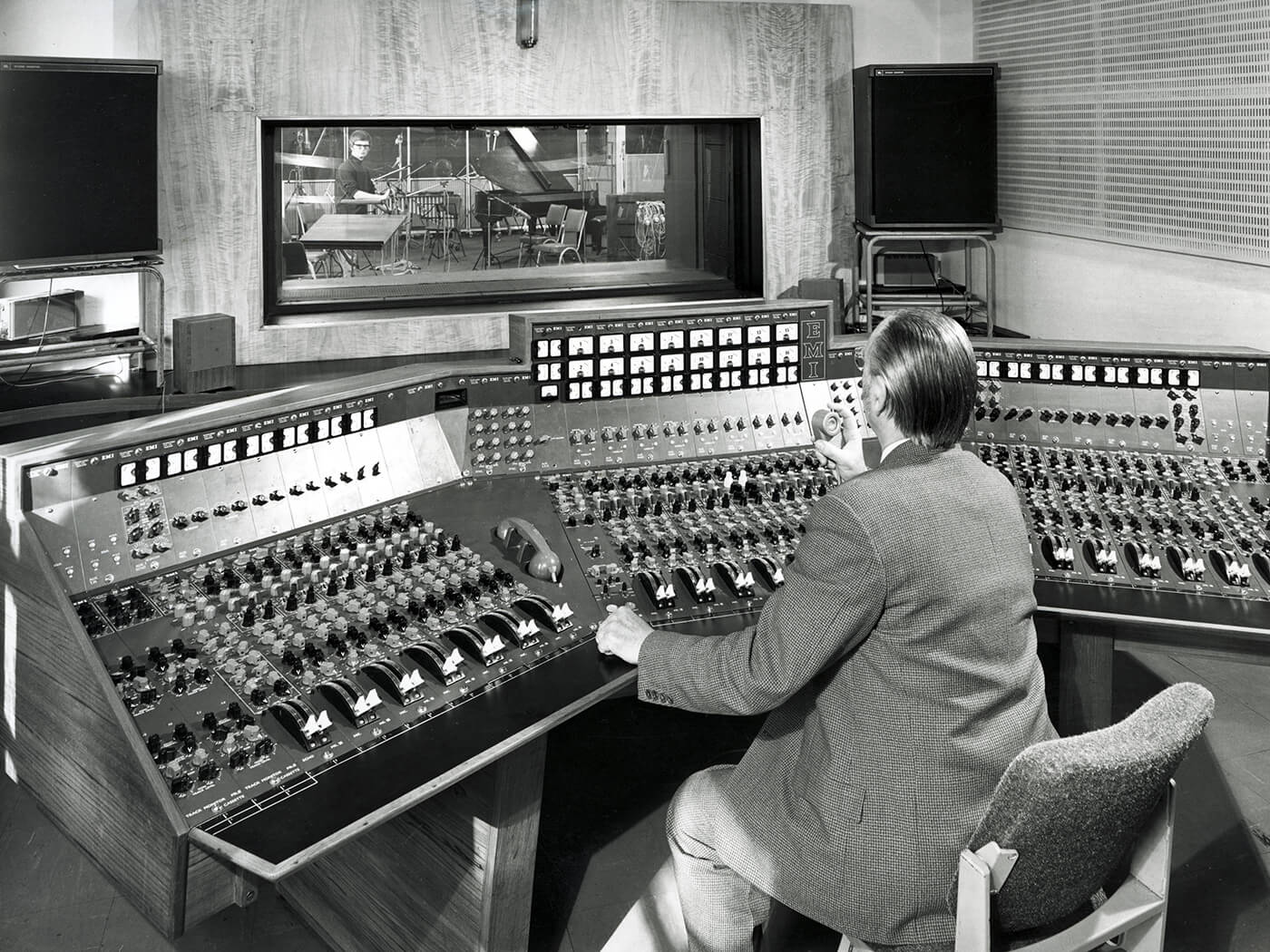
- Music Wolf
Frequent Poster -
Posts: 2886 Joined: Fri Feb 17, 2006 12:00 am
Location: Exiled to St Helens
Contact:
No One There
https://starbelly.bandmule.com/
https://starbelly.bandmule.com/
Re: Buying microphone cable, 100m drums.
Advanced hybrid constructivist.
Re: Buying microphone cable, 100m drums.
I'm nearly out of Brylcreem.... 
- Hugh Robjohns
Moderator -
Posts: 43060 Joined: Fri Jul 25, 2003 12:00 am
Location: Worcestershire, UK
Contact:
Technical Editor, Sound On Sound...
(But generally posting my own personal views and not necessarily those of SOS, the company or the magazine!)
In my world, things get less strange when I read the manual...
(But generally posting my own personal views and not necessarily those of SOS, the company or the magazine!)
In my world, things get less strange when I read the manual...
Re: Buying microphone cable, 100m drums.
A little goes a long way with you these days.
Last edited by Wonks on Wed Jul 28, 2021 9:59 am, edited 1 time in total.
Reliably fallible.
Re: Buying microphone cable, 100m drums.
Music Wolf wrote: ↑Wed Jul 28, 2021 8:01 amHugh Robjohns wrote: ↑Tue Jul 27, 2021 10:02 pm And then there are other practical benefits, like not accidentally knocking a faders open with your jacket sleeve...
For the benefit of any younger readers who may have wandered in. This is how we used to lay down those sick beats back in the day.
So presumably all these microphones are fully open? (Other than channel 8)
- Drew Stephenson
Apprentice Guru -
Posts: 29065 Joined: Sun Jul 05, 2015 12:00 am
Location: York
Contact:
(The forumuser formerly known as Blinddrew)
Ignore the post count, I have no idea what I'm doing...
https://drewstephenson.bandcamp.com/
Ignore the post count, I have no idea what I'm doing...
https://drewstephenson.bandcamp.com/
Re: Buying microphone cable, 100m drums.
Nope. That's a commercial music studio (Abbey Road?) using the faders in what has become the 'conventional way', not a BBC studio.
The real reason the BBC used faders opening towards the operator is entirely logical.
The early broadcast consoles, like this Type B desk, used rotary faders -- big knobs that you operated by rotating your wrist. They were fast and accurate, but you could only operate a maximum of two at a time. Then someone came up with the idea of a 'linear fader' with a pivoted arm which dragged contacts across an arc of studs, each connected to a chain of resistors to make an adjustable balanced attenuator. (Note the two microswitches which operate at each end of the fader travel.)

This arrangement allows a lot of faders to be placed next to each other so that several could be operated with separate fingers, allowing multiple channels to be balanced simultaneously, and allowing far more channels to be controlled in a compact desk.
However, the fader knob obviously travels on an arc -- it goes up and over. Here is a Painton quadrant fader looking end on, with a BBC fader scale.

If that is installed into a flat console desktop, then the scale numbers on the side away from the operator (0-10) become invisible and so it's impossible to open the fader accurately to a particular mark because you can't see it.
But if the fader is configured to open towards the operator, it becomes very easy to open to a particular setting because that's marked on the side facing the operator.
Standard BBC practice was to use 23 (the scale goes up to 30) as the unity gain point on the fader. During rehearsals the operator would 'take levels' and note down the required fader setting on the script -- 20, 23, 27 or whatever it might need. During the recording/broadcast they would note the required value from their script for an upcoming source, place their thumb on the scale in the appropriate position, and be confident that they would open the fader to exactly the right mark every time. The up-and-over action also worked very well with the human wrist -- it is a very natural movement.
EMI also used Painton quadrant faders, but with a different scale and in the opposite direction. The scale had 'Out' at the near end (off) and went up to (I think) +20 at the far end, with ) at the unity mark.
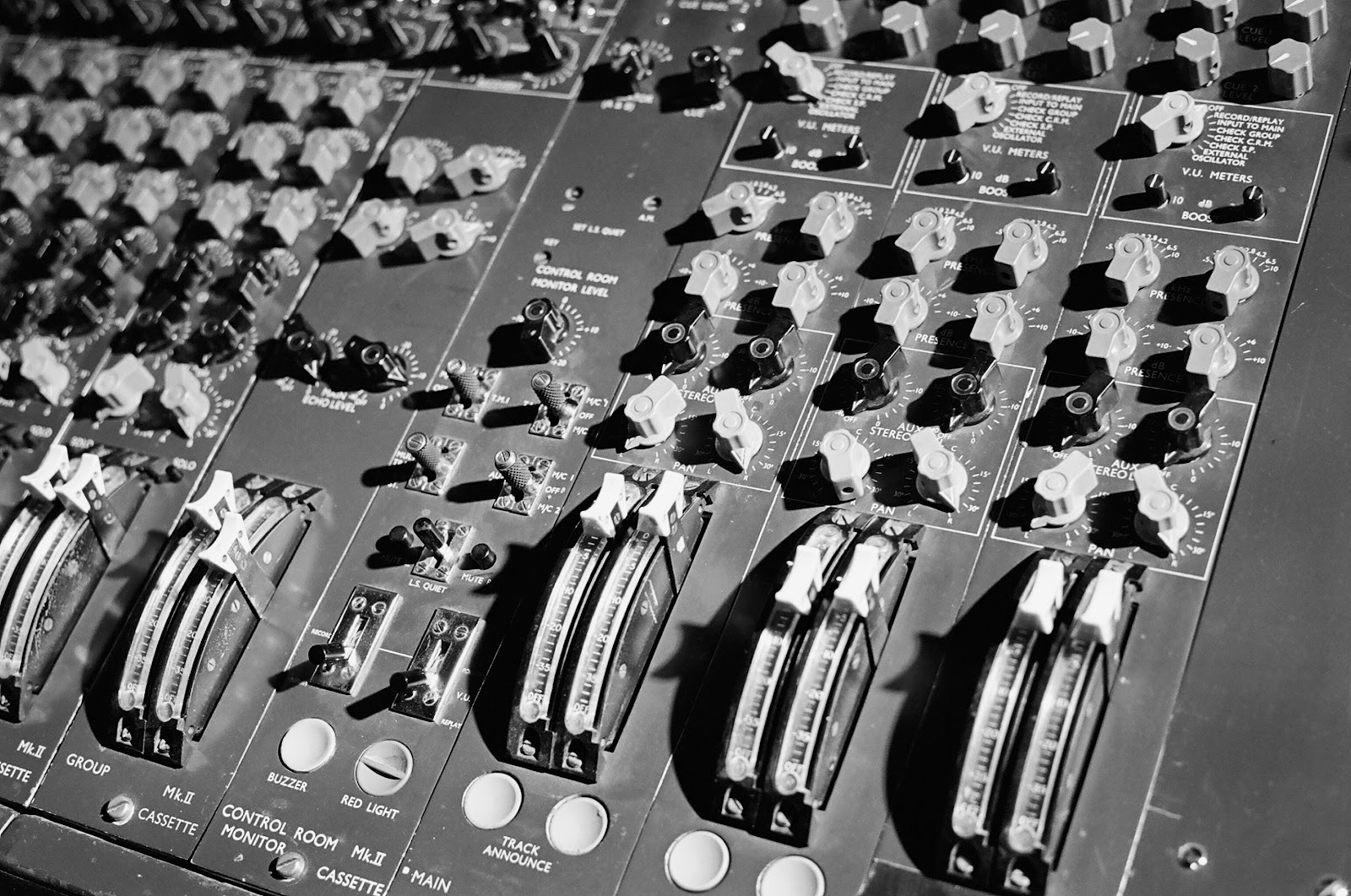
Another nice feature of those Painton quadrant faders was that they could be fitted with lightbulbs at each end to illuminate the perspex cover. That could be used to indicate active channels or, when different colour bulbs were used, to indicate channel group routing (or other functions).

This was over forty years before Studer decided to 'invent' the idea of coloured fader slots to indicate channel routing etc, and patent it as 'FaderGlow'... (Now also seen on some Soundcraft digital consoles too)
The real reason the BBC used faders opening towards the operator is entirely logical.
The early broadcast consoles, like this Type B desk, used rotary faders -- big knobs that you operated by rotating your wrist. They were fast and accurate, but you could only operate a maximum of two at a time. Then someone came up with the idea of a 'linear fader' with a pivoted arm which dragged contacts across an arc of studs, each connected to a chain of resistors to make an adjustable balanced attenuator. (Note the two microswitches which operate at each end of the fader travel.)

This arrangement allows a lot of faders to be placed next to each other so that several could be operated with separate fingers, allowing multiple channels to be balanced simultaneously, and allowing far more channels to be controlled in a compact desk.
However, the fader knob obviously travels on an arc -- it goes up and over. Here is a Painton quadrant fader looking end on, with a BBC fader scale.

If that is installed into a flat console desktop, then the scale numbers on the side away from the operator (0-10) become invisible and so it's impossible to open the fader accurately to a particular mark because you can't see it.
But if the fader is configured to open towards the operator, it becomes very easy to open to a particular setting because that's marked on the side facing the operator.
Standard BBC practice was to use 23 (the scale goes up to 30) as the unity gain point on the fader. During rehearsals the operator would 'take levels' and note down the required fader setting on the script -- 20, 23, 27 or whatever it might need. During the recording/broadcast they would note the required value from their script for an upcoming source, place their thumb on the scale in the appropriate position, and be confident that they would open the fader to exactly the right mark every time. The up-and-over action also worked very well with the human wrist -- it is a very natural movement.
EMI also used Painton quadrant faders, but with a different scale and in the opposite direction. The scale had 'Out' at the near end (off) and went up to (I think) +20 at the far end, with ) at the unity mark.
Another nice feature of those Painton quadrant faders was that they could be fitted with lightbulbs at each end to illuminate the perspex cover. That could be used to indicate active channels or, when different colour bulbs were used, to indicate channel group routing (or other functions).

This was over forty years before Studer decided to 'invent' the idea of coloured fader slots to indicate channel routing etc, and patent it as 'FaderGlow'... (Now also seen on some Soundcraft digital consoles too)
- Hugh Robjohns
Moderator -
Posts: 43060 Joined: Fri Jul 25, 2003 12:00 am
Location: Worcestershire, UK
Contact:
Technical Editor, Sound On Sound...
(But generally posting my own personal views and not necessarily those of SOS, the company or the magazine!)
In my world, things get less strange when I read the manual...
(But generally posting my own personal views and not necessarily those of SOS, the company or the magazine!)
In my world, things get less strange when I read the manual...
Re: Buying microphone cable, 100m drums.
Music Wolf wrote: ↑Wed Jul 28, 2021 8:01 am
For the benefit of any younger readers who may have wandered in. This is how we used to lay down those sick beats back in the day.
I’m trying to pin down those large monitors, I see a Quad 33/50e under the right hand speaker, but can’t work out what those monitors are.
Advanced hybrid constructivist.
Re: Buying microphone cable, 100m drums.
Fascinating! Something new every day etc 
- nathanscribe
Frequent Poster -
Posts: 1555 Joined: Fri Jan 19, 2007 12:00 am
Location: Wakefield, for my sins.
Contact:
I have no idea what I'm doing.
Re: Buying microphone cable, 100m drums.
Thanks for the info Hugh. Fascinating stuff indeed.
I’m definitely going to have to try it out.
As for the ‘fader glow’ you can also find it on some newer Calrecs too…
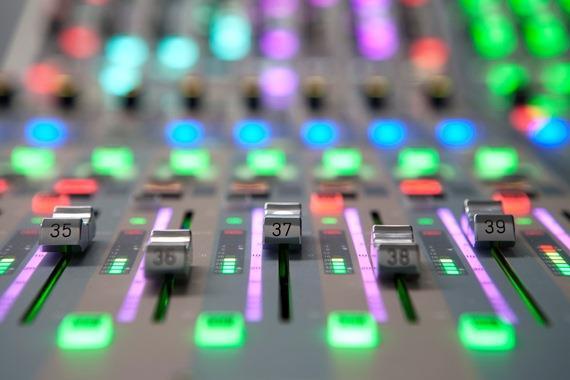
I’m definitely going to have to try it out.
As for the ‘fader glow’ you can also find it on some newer Calrecs too…

Re: Buying microphone cable, 100m drums.
My guess would be Altec Lansing 605A 'Duplex' monitors
Here's the 'hi-fi' version:
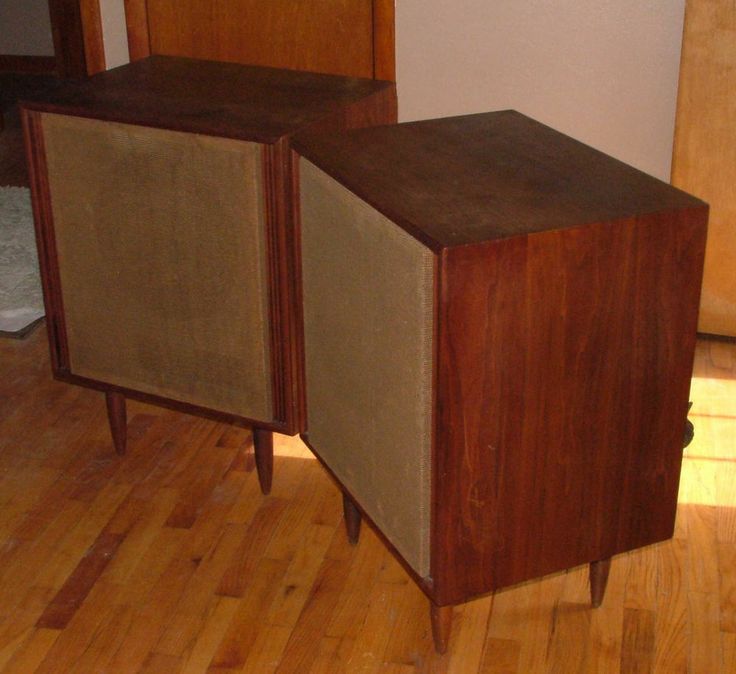
Comprised a 15-inch woofer with a mid/treble horn. Used at Abbey Road in the pop music studios (2/3 -- and that picture looks to me like it's Studio 3) from the 1960s.
- Hugh Robjohns
Moderator -
Posts: 43060 Joined: Fri Jul 25, 2003 12:00 am
Location: Worcestershire, UK
Contact:
Technical Editor, Sound On Sound...
(But generally posting my own personal views and not necessarily those of SOS, the company or the magazine!)
In my world, things get less strange when I read the manual...
(But generally posting my own personal views and not necessarily those of SOS, the company or the magazine!)
In my world, things get less strange when I read the manual...
Re: Buying microphone cable, 100m drums.
Ah... well... there's an interesting story there.
I don't know what the current situation is with Calrec, but I believe Studer tried to prevent Calrec from using their coloured ID strips alongside the faders by claiming the patent they somehow were granted on their own 'FaderGlow' system covered Calrec's system too because it was conceptually similar (but physically completely different).
Studer's engineering of the FaderGlow system is quite clever and typically Swiss. But I still struggle to understand how they could claim FaderGlow as a unique invention when the concept of electronically selectable coloured, back-lit faders or fader slots or fader escutcheons, as an aid function identification, pre-dates their design by nearly fifty years, and with at least four practical implementations of similar schemes in existence in the UK alone!
The first implementation of the idea that I know of was with the Painton faders, as already discussed. The next I know of was when SADiE introduced coloured virtual fader slots to indicate different fader automation modes in V3.0 of their DAW, which was around 1996. One of the nicest implementations of the concept of changing fader colour to indicate function was from Audix Broadcast (UK). They showed a really clever and fully functional prototype system in 2001 where the actual fader knob changed colour. Sadly, AFAIK no commercial product was ever made with their technology. Calrec's system on the Apollo desk (as in the image above) was around the early 2000s, as in your picture and it used a strip of multicoloured LEDs running alongside the fader slot.
In contrast Studer's FaderGlow system uses an end-lit perspex strip mounted inside the fader slot.
- Hugh Robjohns
Moderator -
Posts: 43060 Joined: Fri Jul 25, 2003 12:00 am
Location: Worcestershire, UK
Contact:
Technical Editor, Sound On Sound...
(But generally posting my own personal views and not necessarily those of SOS, the company or the magazine!)
In my world, things get less strange when I read the manual...
(But generally posting my own personal views and not necessarily those of SOS, the company or the magazine!)
In my world, things get less strange when I read the manual...
Re: Buying microphone cable, 100m drums.
I now want an old BBC console.
Just because.
(I don't want to have to maintain it though! )
)
Just because.
(I don't want to have to maintain it though!
- Drew Stephenson
Apprentice Guru -
Posts: 29065 Joined: Sun Jul 05, 2015 12:00 am
Location: York
Contact:
(The forumuser formerly known as Blinddrew)
Ignore the post count, I have no idea what I'm doing...
https://drewstephenson.bandcamp.com/
Ignore the post count, I have no idea what I'm doing...
https://drewstephenson.bandcamp.com/
Re: Buying microphone cable, 100m drums.
Actually, not that hard to maintain. All discrete components on relatively spacious circuit boards in well-engineered chassis, and wonderfully detailed comprehensive service manuals still exist.
This is a section of a BBC Type D console -- the type I did my first live broadcasts on:
And here's a typical* channel module:
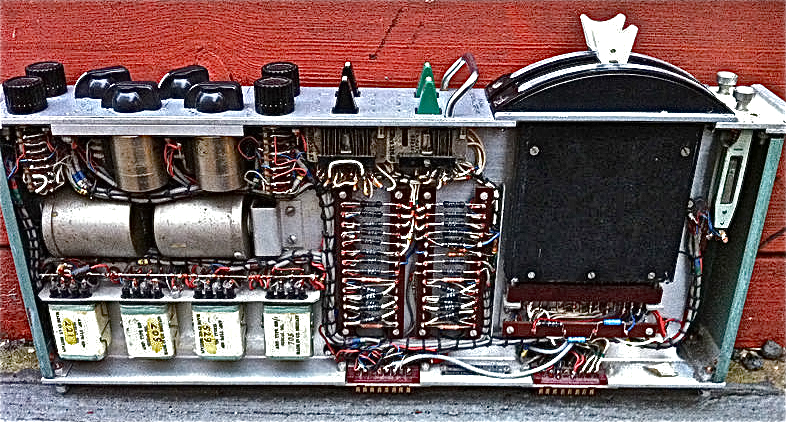
*This particular module is supposed to be from an EMI console, but it is uncannily similar to the BBC Type D...
- Hugh Robjohns
Moderator -
Posts: 43060 Joined: Fri Jul 25, 2003 12:00 am
Location: Worcestershire, UK
Contact:
Technical Editor, Sound On Sound...
(But generally posting my own personal views and not necessarily those of SOS, the company or the magazine!)
In my world, things get less strange when I read the manual...
(But generally posting my own personal views and not necessarily those of SOS, the company or the magazine!)
In my world, things get less strange when I read the manual...
Re: Buying microphone cable, 100m drums.
Hugh Robjohns wrote: ↑Wed Jul 28, 2021 11:00 am One of the nicest implementations of the concept of changing fader colour to indicate function was from Audix Broadcast (UK). They showed a really clever and fully functional prototype system in 2001 where the actual fader knob changed colour. Sadly, AFAIK no commercial product was ever made with their technology.
That looks great. I did a few shows on a Soundcraft console with the FaderGlow system and was amazed at how effective it was. I initially thought it was a bit of a gimmick, and it's probably not for everyone, but my brain loves a bit of colour coding and it really helped find my way around when changing between banks/scenes etc.
Re: Buying microphone cable, 100m drums.
Hugh Robjohns wrote: ↑Wed Jul 28, 2021 10:52 am
My guess would be Altec Lansing 605A 'Duplex' monitors
Here's the 'hi-fi' version:
Comprised a 15-inch woofer with a mid/treble horn. Used at Abbey Road in the pop music studios (2/3 -- and that picture looks to me like it's Studio 3) from the 1960s.
Thanks Hugh, they look very much "the part" where’s my herringbone jacket?
Advanced hybrid constructivist.